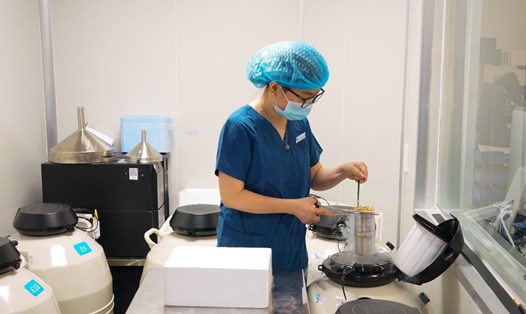In an internal meeting of a foreign company regarding the welfare policy for employees performing medically prescribed reproductive support supported by the company, Mr. TMH (32 years old, Ho Chi Minh City) boldly asked Question to company leaders: In addition to the regimes prescribed by the state such as health insurance and maternity benefits for men or women when they have children, does the company's support package include support? Support related to IVF, egg storage... or not?
Mr. H said that currently, not only him but also many other colleagues tend to get married late and have trouble having children, but the cost of treatments is still high compared to their income, so Health insurance policies offered by the company need this additional support.
Responding to this issue, the company representative said, with "Welfare policy for employees performing medically prescribed reproductive support", the company is proud to be a pioneer in applying this policy. This is for employees globally, including Vietnam. Accordingly, all company employees will be covered for treatment costs with assisted reproductive methods such as: in vitro fertilization (IVF), sperm injection into the ovaries, sperm injection into the oocyte cytoplasm. , ovulation stimulation, male infertility treatment, egg freezing...
Companies with such policies as above are only a few, but in reality today, the majority of workers who are infertile , infertile or need to store eggs have to manage on their own because there is no such policy. of the state currently supports this.
According to Master, Doctor Ho Manh Tuong - Director of the Center for Genetic Research and Reproductive Health, Faculty of Medicine, National University of Ho Chi Minh City, in the past 20 years, Vietnam's population policy has reduced fertility, causing problems. The issue of infertility support is not considered. When fertility rates decrease, the problem of infertility emerges because most young people marry late, leading to few or no children. Reproductive support policies cannot be changed immediately, so currently, health insurance units do not pay for infertility examination and treatment, creating a burden for couples who want to have a complete family.
In recent years, infertility examination and treatment techniques have developed greatly, so many treatment methods are available. However, high costs are still a barrier for couples. Although this cost in Vietnam is lower than other countries in the region, compared to the average income in Vietnam, it is still a burden.
Also according to Dr. Tuong, in some European countries, all costs related to infertility treatment are covered and some neighboring countries in Asia also have a partial payment policy in response to pressure to reduce fertility. big birth. Infertility rates in Vietnam are high due to environmental pollution and lifestyle changes that reduce the ability to get pregnant. Therefore, the government should pay attention to reproductive policies for infertile people in the future.






